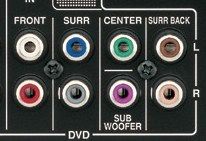So i started reading up on HDMI 1.3.. and notice it supports deeper color bits.. and also able to transmit Dolby TrueHD raw bitstreams.
So looking around on the PC world.. There's no vid card/vid card sound card that supports HDMI 1.3 currently? Therefore it would be impossible to send Dolby TrueHD raw bitstreams over to your reciever if you play a HD disc with Dolby TrueHD on your PC?
well, i guess here's hope that future vidcards will soon support HDMI 1.3, and have a internal digital passthrough that allows you to use your sound card/interface of choosing(which hopefully will support at least TrueHD passthrough, if not also realtime TrueHD encoding for all other sounds, like from games)
So looking around on the PC world.. There's no vid card/vid card sound card that supports HDMI 1.3 currently? Therefore it would be impossible to send Dolby TrueHD raw bitstreams over to your reciever if you play a HD disc with Dolby TrueHD on your PC?
well, i guess here's hope that future vidcards will soon support HDMI 1.3, and have a internal digital passthrough that allows you to use your sound card/interface of choosing(which hopefully will support at least TrueHD passthrough, if not also realtime TrueHD encoding for all other sounds, like from games)
![[H]ard|Forum](/styles/hardforum/xenforo/logo_dark.png)

